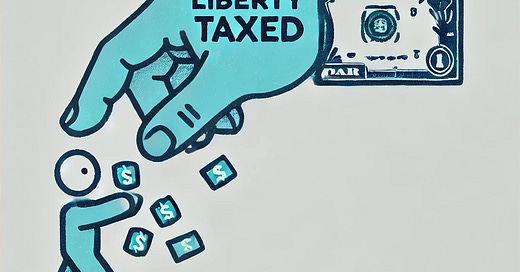Tax Tracker | Five-Year Bill, Spending Cuts, Two Executive Orders on Tax
Links for the 2025 tax debate.
The battle over how to extend President Trump’s signature legislative accomplishment continues to drag on. The House missed its first self-imposed deadline to markup the “one big beautiful” budget resolution this week, prompting the Senate to jumpstart its own process for a two-bill strategy.
This edition of the Tax Tracker reports on the most important big-picture components of the tax debate: the duration, the type of tax cuts, and the effect on the debt. The last two items review Trump’s Executive Orders on the Global Tax Deal and reinstating a review process for tax regulations that the Biden administration abandoned.
Here are this week’s tax highlights:
Will the tax bill be pro-growth? Two things will determine how much growth you can expect from the 2025 tax cuts: the duration of the changes and the type of tax cuts.
Temporary tax cuts are not pro-growth. However, Richard Rubin reports that some Republicans are considering a short term extension of the expiring 2017 law. This would directly undermine the goal of a pro-growth tax bill. Erica York and Alex Muresianu recently observed that “if lawmakers give in to budgetary pressures and only make temporary improvements to cost recovery, it will undercut what would otherwise be a powerful economic incentive to invest in the United States.”
The most pro-growth tax cuts include improved cost recovery (also called expensing) and lower business tax rates, like Trump’s 15 percent corporate tax (which we wrote about here). Recent empirical research from Stanford economists Jonathan Hartley, Kevin Hassett, and Joshua Rauh confirms that investment categories benefitting most from lower tax rates and expensing saw the largest increases in investment, with effects exceeding prior estimates.
Ensuring that tax policy is permanent and investment-friendly will solidify its economic benefits and make addressing the fiscal situation easier.
Related Links:
Lots of tax cuts, not a lot of growth?
Bernie Becker, Politico
Expensing Could Help Manufacturing’s Productivity Problem
Adam Michel, Cato Institute
Will Republicans follow through on spending cuts? Last week, the largest faction of House Republicans—the Republican Study Committee—officially adopted the position that the “Reconciliation legislation must reduce the federal budget deficit.” The group added, “Our national security depends on our ability to bring about meaningful fiscal reform.”
In a recent Wall Street Journal op-ed, House Budget Committee Chairman Jodey Arrington (R-TX) similarly warned, "It’s time to face reality. The era of spending without limits or accountability has reached its breaking point.” Cutting spending and tax expenditures (spending in the tax code) is the only way to extend the tax cuts without adding to the debt.
Related Links:
Achieving Fiscally Responsible Tax Reform
Arnold Ventures
To Help Pay for Trump Tax Cuts, New Taxes on Worker Benefits Become GOP Target
Cheryl Winokur Munk, CNBC
12 Ways for Trump to Improve the Tax Code and Make His Tax Cuts Permanent
Adam Michel, Cato Institute
Trump rejects global tax deals. Trump issued an Executive Order to “notify the OECD [Organisation for Economic Co-operation and Development] that any commitments made by the prior administration on behalf of the United States with respect to the Global Tax Deal have no force or effect within the United States.” My summary here.
Joshua Rauh and Aharon Friedman laud Trump’s move as “a rejection of imperialism by foreign powers and unaccountable international bureaucrats, whom the Biden Administration aided and abetted.” They warn that allowing the OECD “to create new fake international law dictating domestic tax policy that is binding on all countries would be a serious blow against representative government and individual liberty.”
The United States also pulled out of a similar tax harmonization effort led by the United Nations, stating, “We reject the very nature of these discussions.”
Related Links:
Letter to President Trump in Appreciation of Executive Actions
Led by Rep. Ron Estes
Adam Michel, Cato Institute
Former US OECD Negotiator Talks Trump's Global Tax Impact
David Stewart, Stephanie Soong, Scott M. Levine, Tax Notes Talk
Tax regulations get OIRA review again. Trump reinstated key oversight rules for tax regulations issued by Treasury and IRS. A January 31 Executive Order, “Unleashing Prosperity Through Deregulation,” revokes the Biden administration’s 2023 memorandum that exempted tax regulations from the standard review process. I argued for this change in the Cato Handbook on Executive Orders, writing, “Tax regulations are often the most consequential actions taken by the government, interpreting laws that directly deprive individuals and businesses of their incomes… These significant economic regulations should not be exempt from standard regulatory review.”
The Executive Order also requires the repeal of 10 rules, regulations, or guidance documents for every new one action, strengthening Trump’s first term 2-to-1 requirement.
Related Links:





